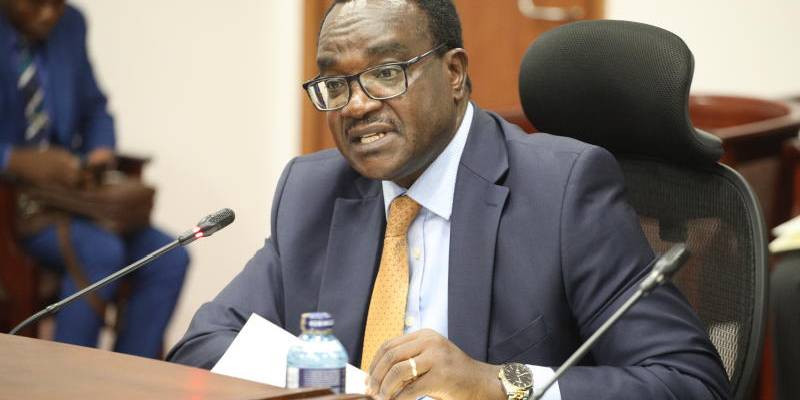UoN going down? Fight for power, mega assets leave university in a mess
National
By
Augustine Oduor and Lewis Nyaundi
| May 15, 2025

The scramble for over Sh200 billion worth of assets at the University of Nairobi is threatening to collapse the premier institution in full glare of the authorities.
The assets that include huge tracts of land and prime houses spread across strategic city estates, it emerged, has over the years been at the centre of unending wrangles that insiders claim are instigated by powerful external forces.
The Standard has also established that the push to employ cronies and relatives by senior government officials and politicians, fuel the incessant fights that cripple teaching and learning.
With a student population of about 50,000 and teaching and non-teaching staff of about 3,500, the University of Nairobi has been in the eye of storm.
READ MORE
IMF flags Sh175b fuel levy plan over debt, transparency risks
Kenya's debt spirals as revenue crisis threatens economic stability
Cybersecurity, trust woes slow Kenya's e-commerce growth
Ex-dock officials decry plot against KPA boss
Airtel sees more room in mobile money as revenue hits Sh184b
KenGen's wind power project in Marsabit faces new hurdles
Technopolis Bill positions Kenya as tech powerhouse, senators say
Prices soften as clothes stores record growth
Kenya to host first-ever Pan-African artificial intelligence conference
Kenya races to meet EU deforestation regulation deadline for coffee exports
At the heart of the renewed turmoil is a bitter tug-of-war between Education Cabinet Secretary Julius Ogamba and University Council Chairperson Prof Amukowa Anangwe—both flexing muscles over who calls the shots at the institution in the appointment of vice chancellor.
And the matter has been complicated after the law on recruitment was reviewed, giving the Public Service Commission (PSC) power to advertise, shortlist and interview candidates.
PSC merit list seen by The Standard reveals that Prof Bitange Ndemo emerged top VC with a score of 84 per cent. Second was Prof Duke Orata with 73 per cent and Prof Francis Jackim Mulaa 66.7 per cent. This merit list, it emerged, was the source of conflict between Ogamba and the council.
Prof Ndemo has since announced he is no longer interested in the position after the push and pull between the council and Jogoo house got messy.
However, a letter by Prof Anangwe and two other council members insists that Prof Ndemo is the rightful candidate for VC seat. Prof Anangwe says Ndemo remains the legitimate incoming vice chancellor as he is yet to formally decline the role.
Letters of correspondence between Ogamba and Anangwe reveal back and forth intellectual interpretation of the Universities Act, laced with ego contest between the two, each claiming power to call the shots on VC appointment.
On May 2, 2025, Ogamba declined a special council meeting request by Anangwe scheduled on April 2 to consider the PSC names, kicking off a cat and mouse game between Jogoo House and the university, muddying the process.
Complicating the appointment process was the decision by Ogamba to de-gazette the university council which was later reinstated by a court order. Insiders argue that Ogamba was against the Council meeting to fast-track the appointment of VC.
A summon of the council members to the Ethics and Anti-Corruption Commission followed after it emerged that the council had scheduled a meting against Ogamba’s consent.
Despite these, on the same day, May 2, Anangwe wrote to Ogamba, announcing that he had appointed Prof Ndemo, citing a special leeway granted to him by the council to act on behalf of the council in matters within the mandate of the council.
It is this leeway that Anangwe tapped to appoint Prof Ndemo as VC without holding a council meeting. “The chairperson of the University of Nairobi Council appoints Prof Elijah Bitange Ndemo, as the Vice Chancellor of the University of Nairobi with effect from May 2, 2025, subject to ratification by the council,” Anangwe wrote to Ogamba.
According to the law, the University Council is mandated to conduct the appointment of the VC in concurrence with the Education Cabinet Secretary.
This also formed part of a major disagreement between Ogamba and Anangwe.
Anangwe insists that while the Universities Act 2016 directs the university council to consult with the Education Cabinet Secretary in the appointment of a VC, they don’t necessarily have to put his input into consideration.
“Consultation does not give the consultee veto powers over the decision. But it does not permit the consultor to disregard the input of the consultee without good reason,” said Anangwe said, quoting a 2022 judgement that ruled on the interpretation of “consultation.”
“The University of Nairobi Council, being the appointing authority of the Vice Chancellor and Deputy Vice Chancellors, has the final say who to appoint, and may disregard the Cabinet Secretary’s contrary opinion with a good reason,” Anangwe said in the letter.
But in his letter, Ogamba said he would not act on the request of Anangwe is he fails to provide documents that mandate him to act on behalf of the council.
This was on the argument that the council is not properly constituted and may not have a quorum to make such decisions.
Richard Bosire, UASU chairman, UoN chapter, said since the wrangles, PS Education/Rep, PS Treasury/Rep, the VC have not been attending the council meetings.
Also adding to the council troubles is the withdrawal of two of four Council members appointed by the CS Education, whose appointment was revoked by Education CS Ogamba and have expressed lack of interest in challenging the revocation.
This, Bosire argues, has reduced the council to a lame duck and lacks legitimacy in exercising any of its mandate.
“The council cannot meet; it's not properly constituted. Another thing regarding this appointment is also that the process requires that there is concurrence between the minister and the council. So, without the council, the council chair cannot purport to have done the appointments on behalf of the council, because he is not the council,” Bosire said in a phone interview.
But a section of students accused the Ministry of Education of meddling and encroaching on the university council's mandate. The students warned that the ministry's interference has run down the institution and led a loop in the execution of services in the university which has affected students.
“When we go to the dean and we have some issues, he will tell us that he is not able to solve some of the issues because holders of the relevant offices are in acting capacity and they are not able to execute some of their mandate,” Ngetich Soi, one of the students said.
He added that the appointment of a substantive VC would ensure a return to normalcy and effective service delivery.
Over the years, recruitment of top-level managers–vice chancellor and the deputy vice chancellors– has polarised the university, as unending court battles and ego contests between the ministry and the council take centre stage.
And the script of trail of destruction has always been predictable: appointment of the council and subsequent degazzetment of the members when the tiff hots up.
At least five education cabinet secretaries have had a fight with the University of Nairobi council and in each case, the issues revolved around the recruitment of the vice chancellor and DVCs, and the performance of the Council.
Then CSs Fred Matiangi, Amina Mohammed, and Ezekiel Machogu has each picked a fight with the university council.
The latest contest comes barely eight months after the controversial ouster of University of Nairobi Vice Chancellor Prof Stephen Kiama.
The two are now entangled in legal fight over the leadership of the university with the control of billions of the university's estate and assets being at the centre of the fight.
The institution has rapidly plunged into another messy power struggle that is fast spiralling into an institutional crisis.
Sources at the university revealed that external forces are behind the wrangles with eye on the huge resource base of the institution. “This has been a theatre for looting. Each senior officials push to have their own to be in charge of the university so that they can have access to the huge resources. We have prime land across the country,” said a senior university official.
“And we also have houses in prime estates. And many also want their kin employed here. This is the crux of the matter. Unfortunately, this will not end now. Expect more problems,” added the official.
According to some Council members, senior government officials who have set their eyes on the institution’s resources are behind the fights.
“They want a favourable VC in place to facilitate the looting. The Council has been summoned and advised on how to behave but after they declined, trouble began.”
But sources at Jogoo House argue that the Council has usurped its mandate and must exit the university.
The fight has seen the council shrink from its full composition of nine members and now has only three active members, putting to question the legitimacy of the council to make any decision. Inside sources indicate that the council is ‘toothless’ with the council chair lacking legitimacy.
According to Article 36 (1) of the Universities Act 2012, the Council consists of nine members– Chairman, PS Education/Rep, PS Treasury/Rep, Five members appointed by CS Education and the VC as ex-officio member and Secretary to Council.
Currently, the membership includes Prof Anangwe, who is the embattled chairman, alongside council members Carren Omwenga and Ahmed Abdullahi, whose membership was revoked but got a court order halting the revocation.
Dr Parmain ole Narikae and Sally Ngerigwony Toroitich, whose appointment was also revoked, distanced themselves from the petition challenging the revocation.
This means the two will no longer serve as council members and will not challenge the same in court. In December, the CS had degazetted Joel Kibe as a member of the council, marking the start of deconstructing the university council.
This further complicates the appointment process as the university faces a hurdle of a lack of proper constitution.
A letter drafted and signed by Anangwe and two other Council members, however, insists that Prof Ndemo is the rightful candidate for VC seat.
This is even after Ndemo quit the race. The fresh wrangles now replicate a familiar script in what has become the order of the institution’s leadership transition in the last 10 years.
The removal of Kiama, who was sacked by the University Council after suspension, mirrors the exit of Prof Peter Mbithi in late 2019. His exit was also dramatic.
Prof Mbithi, who had survived run-ins with the university council led by then council chair Julia Ojiambo was accused of running down the university despite taking over from Prof George Magoha who was hailed as the most successful VC in the institution’s history.
He is revered for the construction of the multi-million University of Nairobi Towers and leaving a surplus in billions in the university coffers.
However, Prof Mbithi would have a hard time fitting into his predecessor’s shoes after taking over in 2015 as the institution sank into debt and occasional run-ins with the Ministry of Education over the appointment of university officials.
The epitome of power struggle would start when Mbithi sought an automatic renewal of his second term after serving a tumultuous five-year term.
The University Council asked Mbithi to apply for the job alongside the other candidates, noting that the changes in the appointment of Vice Chancellors had changed and involved the Public Service Commission in the hiring of VCs.
This saw Prof Mbithi drop his bid for a second term officially making him a one term VC. Similarly, Prof Kiama’s unceremonious exit in October last year replicated the removal of his predecessor.

